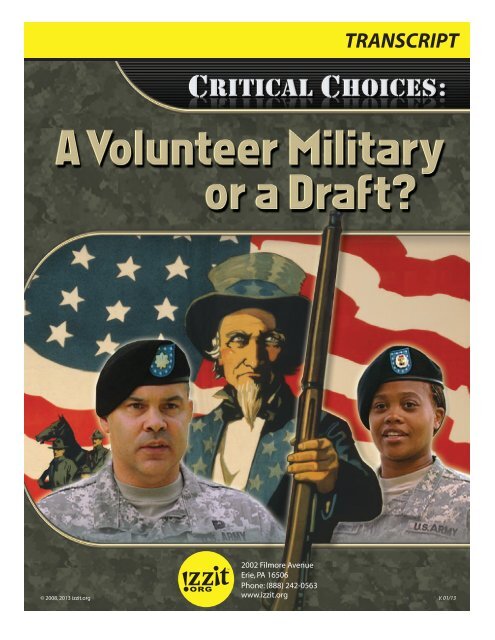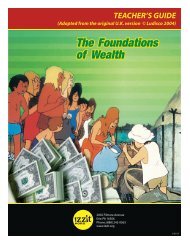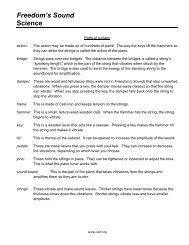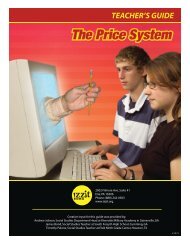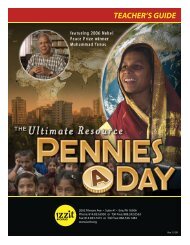A Volunteer Military or a Draft? - Izzit.org
A Volunteer Military or a Draft? - Izzit.org
A Volunteer Military or a Draft? - Izzit.org
You also want an ePaper? Increase the reach of your titles
YUMPU automatically turns print PDFs into web optimized ePapers that Google loves.
© 2008, 2013 izzit.<strong>or</strong>g<br />
TRANSCRIPT<br />
2002 Film<strong>or</strong>e Avenue<br />
Erie, PA 16506<br />
Phone: (888) 242-0563<br />
www.izzit.<strong>or</strong>g V. 01/13
Critical Choices:<br />
An All-<strong>Volunteer</strong> <strong>Military</strong> <strong>or</strong> a <strong>Draft</strong>?<br />
Transcript<br />
F<strong>or</strong> a list of additional resources to use with this video go to<br />
www.izzit.<strong>or</strong>g/products and click on the <strong>Volunteer</strong> <strong>Military</strong> <strong>or</strong> a <strong>Draft</strong>? video.<br />
SGT. CHANDAN RANDHAWA: Joining the Army is a very, very big life decision. It's not like going<br />
to McDonald's <strong>or</strong> w<strong>or</strong>king nine to five.<br />
GREG LAUTNER: The Army likes an all-volunteer f<strong>or</strong>ce f<strong>or</strong> several reasons: one, it lets the Army be<br />
m<strong>or</strong>e selective, and we can focus m<strong>or</strong>e on quality.<br />
MARTIN ANDERSON: What do you think about being drafted if you don't want to go? How about the<br />
women?<br />
PETEY GILMADOR: Women have the same political rights then they should be expected to have the<br />
same duties.<br />
ANDERSON: We let women vote on this, but they can't be drafted.<br />
STAFF SGT. KIMBERLY GLEATON-STALLINGS: My reason f<strong>or</strong> joining the Army was just to<br />
basically serve my country. Honestly, it was.<br />
GILMADOR: The government should be able, in a sense, to require <strong>or</strong> demand certain things of citizens.<br />
DAVID KENNEDY: In ancient Greece, f<strong>or</strong> example, you could not be a full citizen unless you were<br />
ready to shoulder arms.<br />
MIKE SPEARTOS: You're already being made to do things f<strong>or</strong> your government. Opt-in, buy-in.<br />
You're part of the country. Deal with it.<br />
BYRON RUBY: I think the most imp<strong>or</strong>tant thing is the individual's right to choose what they want to do<br />
with their life since, after all- that is why we have democracy in the first place.<br />
RANDHAWA: I'm caught right in the middle because I believe everybody should want to serve their<br />
country at least a couple of years.<br />
KENNEDY: Well, hist<strong>or</strong>ically, there's a very strong linkage between the obligation of the military<br />
service, on the one hand, and possessing the full rights of citizenship on the other. In Ancient Greece, f<strong>or</strong><br />
example, you could not be a full citizen unless you were ready to shoulder arms and, indeed, in many of<br />
the Greek city states you were expected to bring your own arms to the field, your own shield and sw<strong>or</strong>d<br />
and h<strong>or</strong>se, <strong>or</strong> whatever it might be. Well down into modern hist<strong>or</strong>y this - this linkage between citizenship<br />
and service - has been very, very strong.<br />
1
In the nineteenth century, the era after Napoleon, most of the European countries had massive conscript<br />
armies. The United States did not. It was a distinguishing characteristic of the society and it is why many<br />
immigrants came here - to avoid military service in Europe.<br />
The one exception to that in the nineteenth century is the Civil War, when both the Confederacy and the<br />
Union then had to res<strong>or</strong>t to obligat<strong>or</strong>y f<strong>or</strong>ce, to military conscription, in <strong>or</strong>der to fill out the ranks of their<br />
armed f<strong>or</strong>ces. The draft was administered by military officers who actually came in unif<strong>or</strong>m into districts<br />
and f<strong>or</strong>ced people into service- and there was plenty of resistance to that. The most not<strong>or</strong>ious example is<br />
in New Y<strong>or</strong>k City. There were maj<strong>or</strong> draft riots when largely Irish immigrants, who had come to this<br />
country not anticipating military service, refused to serve. Dozens of people were killed.<br />
Contrary to a lot of mythology, there was plenty of resistance to the draft in the First W<strong>or</strong>ld War. There<br />
were some 300,000 identified draft evaders. The people that ran the draft in the First W<strong>or</strong>ld War learned,<br />
<strong>or</strong> thought they learned, from some of the mistakes in the Civil War, and instead of having military<br />
officers go into districts and recruit people <strong>or</strong> enlist them, they set up civilian draft boards.<br />
Advertising was just becoming a big business, the techniques were being learned and developed, and<br />
indeed, the military service, <strong>or</strong> the draft, in W<strong>or</strong>ld War I was just one of many areas where the<br />
government employed the techniques of this infant industry of advertising to achieve its goals.<br />
The public was heavily propagandized, and indeed, even the conscription system was called “selective<br />
service,” thus putting the w<strong>or</strong>d “service” at the heart of the matter and trying the best they could to<br />
preserve the fiction, as Woodrow Wilson said, that the nation had volunteered en masse f<strong>or</strong> the war,<br />
which was just patently not true, but they tried to perpetuate that idea nonetheless.<br />
This country mustered sixteen million men, and a few hundred thousand women into the armed f<strong>or</strong>ces in<br />
W<strong>or</strong>ld War II, and again, folkl<strong>or</strong>e to the contrary and notwithstanding, the great maj<strong>or</strong>ity of those people<br />
were drafted. It meant that the country really had to buy into this deal. Millions of people had to<br />
somehow feel their being pressed into service was legitimate. The country as a whole had to accept as<br />
legitimate the diversion of f<strong>or</strong>ty percent of its production to wartime purposes, rather than civilian<br />
purposes.<br />
PRESIDENT FRANKLIN DELANO ROOSEVELT: Members of your government are gathered here<br />
in this federal building in Washington to witness the drawing of numbers as provided f<strong>or</strong> in the Selective<br />
Service Act of 1940.<br />
KENNEDY: Once we break that link between massive citizen participation and the actual conduct of the<br />
war, then we raise all kinds of very troubling questions about how easy it is to go to war, whether the<br />
public’s assent is really any longer even necessary f<strong>or</strong> the deployment of military f<strong>or</strong>ce.<br />
W<strong>or</strong>ld War II, in many different senses, ended an era in the hist<strong>or</strong>y of warfare. It was the last war that<br />
was fought, and I believe ever will be fought, between large, huge, massive conscript armies fighting on<br />
the basis of a deeply mobilized industrial economy at home in a protracted war of attrition.<br />
F<strong>or</strong> a period of about - almost 30 years, from the late ‘40s into the early ‘70s - the draft was an en<strong>or</strong>mous<br />
presence in the lives of millions upon millions of people in this society, including me.<br />
The Cold War got hot in Vietnam, and they had an actual shooting war, and a lot of people who’d just as<br />
soon to not be shot at, found themselves conscripted in the service. The draft became a focal point f<strong>or</strong><br />
resistance to the war, protest against it.<br />
2
ANDERSON: A lot of people didn't think we should have a draft. The people that were being drafted<br />
were absolutely sure we shouldn't have a draft.<br />
PRESIDENT LYNDON B. JOHNSON: I shall not seek, and I will not accept, the nomination of my<br />
party f<strong>or</strong> another term as your president.<br />
KENNEDY: In 1968, Richard Nixon became the Republican presidential candidate. And advising the<br />
Nixon campaign there were some quite unlikely champions of those kids out in the streets burning their<br />
draft cards. One of them was Milton Friedman, a very controversial figure, but someone who eventually<br />
won the Nobel Prize in economics.<br />
MILTON FRIEDM AN: I talked to quite a number of SDS groups, and I always got along very well<br />
with them, because it was clear that our objectives were the same. And what we were talking about was<br />
not objectives, but how you achieve those objectives.<br />
KENNEDY: On those grounds he had long called f<strong>or</strong> the end of the draft, and f<strong>or</strong> the creation of<br />
something that many people considered impossible-namely, an all-volunteer army.<br />
FRIEDMAN: The use of compulsion is repugnant to our society except in cases of dire emergency. It is<br />
long past time that we return to our basic heritage, and got rid of the compulsion in our military service,<br />
and return to a voluntary system.<br />
KENNEDY: Nixon wins the election of 1968- but it was a squeaker.<br />
ANDERSON: He only won by a little, tiny fraction. And I think we can say that if he had not said that<br />
he would get rid of the draft he would not have been President of the United States.<br />
KENNEDY: And once he was elected president, Nixon almost immediately created a commission to<br />
consider the idea of creating an all-volunteer f<strong>or</strong>ce. One maj<strong>or</strong> question the commission had to wrestle<br />
with was whether a volunteer f<strong>or</strong>ce would, in effect, become the equivalent of a mercenary army.<br />
Hist<strong>or</strong>ically, people have feared mercenary armies, not least of all because of the whole prospect of<br />
severing the link between military service and citizenship with all of its rights and privileges. Two of the<br />
people on Nixon’s commission were Milton Friedman and Alan Greenspan.<br />
ALAN GREENSPAN: A general who came bef<strong>or</strong>e us in testimony made the case as to why the draft<br />
would be a mercenary army and unacceptable to the American culture, and indeed, f<strong>or</strong> military efficiency.<br />
FRIEDMAN: And so I spoke up and said, “General Westm<strong>or</strong>eland, would you rather command a slave<br />
f<strong>or</strong>ce?” and he said, “I don’t like to hear my drafted soldiers referred to as slaves.” And I said, “I don’t<br />
like to hear my patriotic volunteers referred to as mercenaries.”<br />
GREENSPAN: Milton sat there and took his arguments apart piece by piece - never raised his voice.<br />
FRIEDMAN: In any event, General Westm<strong>or</strong>eland, you are a mercenary general, and I am a mercenary<br />
profess<strong>or</strong>. We are served by a mercenary lawyer. We are served by a mercenary doct<strong>or</strong>.<br />
GREENSPAN: The general got redder and redder- and at the end of this little set of dissections, the<br />
mercenary argument was th<strong>or</strong>oughly demolished.<br />
3
FRIEDMAN: And that was the end of the discussion.<br />
KENNEDY: Sh<strong>or</strong>tly thereafter Nixon’s commission voted unanimously to end the draft, and in 1973, it<br />
became official.<br />
Now the army was competing f<strong>or</strong> employees with every other business in the country, which f<strong>or</strong>ced<br />
improvements in military salaries and benefits.<br />
When the all-volunteer f<strong>or</strong>ce came into being in the 1970s, the military actually hired advertising agencies<br />
and public relations agencies to advise them on how to fill the ranks, and to persuade people that military<br />
service was something they wanted to do.<br />
COMMERCIAL: ……”Hey, Sergeant-Maj<strong>or</strong>!” “How are you, sir?” “Good. Hey, this is the action we<br />
talked about”……<br />
BRIGADIER GENERAL SEAN J. BYRNE: We’re in a market economy and we understand that. And<br />
we have what I think is a great product.<br />
RAY DETHORNE: Advertising f<strong>or</strong> the armed f<strong>or</strong>ces is much m<strong>or</strong>e complicated than it is f<strong>or</strong> a consumer<br />
product. Going into the armed f<strong>or</strong>ces, it’s a life decision. We began crafting ads to reach influencers and<br />
specifically parents…..<br />
COMMERCIAL: …“Dad, there’s something I need to tell you.” “How much is this going to cost<br />
me?”……<br />
DETHORNE: … even m<strong>or</strong>e specifically mothers……<br />
COMMERCIAL: …“Mom, please…”<br />
DETHORNE: It’s the mom that basically stands in the do<strong>or</strong> and says “Whoa, wait a minute.”<br />
COMMERCIAL: “…knowing right from wrong, believing in myself, wanting to go to college – all that<br />
came from you”…<br />
DETHORNE: So what we want to do is make sure that the parents understand what the benefits<br />
service is, how it is a life-changing experience f<strong>or</strong> their child.<br />
BYRNE: What we’re showing in the advertising is really what it’s all about. We’re not trying to varnish<br />
over any kind of issues. It’s tough. You can’t tell them a lie because all they have to do is watch TV at<br />
night and they know what the Army is about.<br />
The difference today is we’ve got five hundred and two thousand - five hundred and two thousand -<br />
volunteers in the Army. These are people that have asked to be in the service. They are here during a time<br />
of war because they want to be.<br />
KENNEDY: I think the principal w<strong>or</strong>ry about the all-volunteer f<strong>or</strong>ce is precisely its capacity to be used<br />
without the civil society in whose name it fights having any very focused <strong>or</strong> felt interest in the actual use<br />
of the f<strong>or</strong>ce.<br />
ANDERSON: Would you like to have a draft?<br />
4
SPEARTOS: A draft makes it harder to go to war because - because the debate is m<strong>or</strong>e reasoned- people<br />
are m<strong>or</strong>e invested.<br />
KENNEDY: As long as we have an all-volunteer f<strong>or</strong>ce, no one is required to pay attention, and no one is<br />
required to put their lives <strong>or</strong> their sons’ and daughters’ lives on the line.<br />
SPEARTOS: We get into our cars, we isolate ourselves, the war happens over there. I don't know a<br />
single person in my life who is fighting in Iraq, not one.<br />
ANDERSON: Go to the high school and get the ones that are 16 <strong>or</strong> 17 years old, say, “Hey, what do you<br />
think about going to Baghdad if you don't want to?” Say there are 50 people in the class. They know<br />
there are three <strong>or</strong> four that might like to go in the military. And if they did, they would be really good at<br />
it. Okay. Is that better than taking by the scruff of the neck someone that does not want to go into it and<br />
not be any good at it? It's much easier to run a bad war with a draft than without it. You just call the<br />
person in charge of the draftees and say, I want 50,000 m<strong>or</strong>e, and he will get your 50,000 m<strong>or</strong>e, and if<br />
they don't turn up, they go to jail.<br />
KENNEDY: That kind of auth<strong>or</strong>ity vested in the government, that kind of capacity to command the lives<br />
of citizens is only legitimate in the face of a truly dire threat to the very existence of the country, on the<br />
scale of W<strong>or</strong>ld War II, let's say. I'm not sure W<strong>or</strong>ld War I really qualifies, as a matter of fact. The Civil<br />
War certainly qualified. But absent a threat on that scale, it seems to me that we ought to be very wary<br />
about granting the government the right to control our lives down to that level, and to that degree.<br />
RANDHAWA: My father served 24 years in the U.S. Air F<strong>or</strong>ce, and my grandfather served 28 years in<br />
the U.S. Army. So I figured it was my turn to do my part.<br />
GLEATON-STALLINGS: I can’t understand why no one wouldn't want to go out and, you know, serve<br />
their country, protect themselves, protect their families, and to do what other f<strong>or</strong>efathers have done f<strong>or</strong> us-<br />
to get us to where we are now.<br />
RUBY: I would only want to be drafted if I would believe the war would be just.<br />
SPEARTOS: You're already being made to do things f<strong>or</strong> your government. Opt-in, buy-in. You're part<br />
of the country. Deal with it!<br />
LAUTNER: I don't want just anybody on my team - only those that are physically qualified, mentally<br />
qualified and academically qualified.<br />
RANDHAWA: We have the right to choose. That's what makes America so great. We have the freedom<br />
to choose.<br />
F<strong>or</strong> a list of additional resources to use with this video go to<br />
www.izzit.<strong>or</strong>g/products and click on the <strong>Volunteer</strong> <strong>Military</strong> <strong>or</strong> a <strong>Draft</strong>? video.<br />
5
We are very interested to learn<br />
how you use our material. Please<br />
share your experiences <strong>or</strong> lesson<br />
plan ideas by visiting us<br />
at www.izzit.<strong>or</strong>g.<br />
2002 Film<strong>or</strong>e Avenue<br />
Erie, PA 16506<br />
Phone: (888) 242-0563<br />
www.izzit.<strong>or</strong>g


